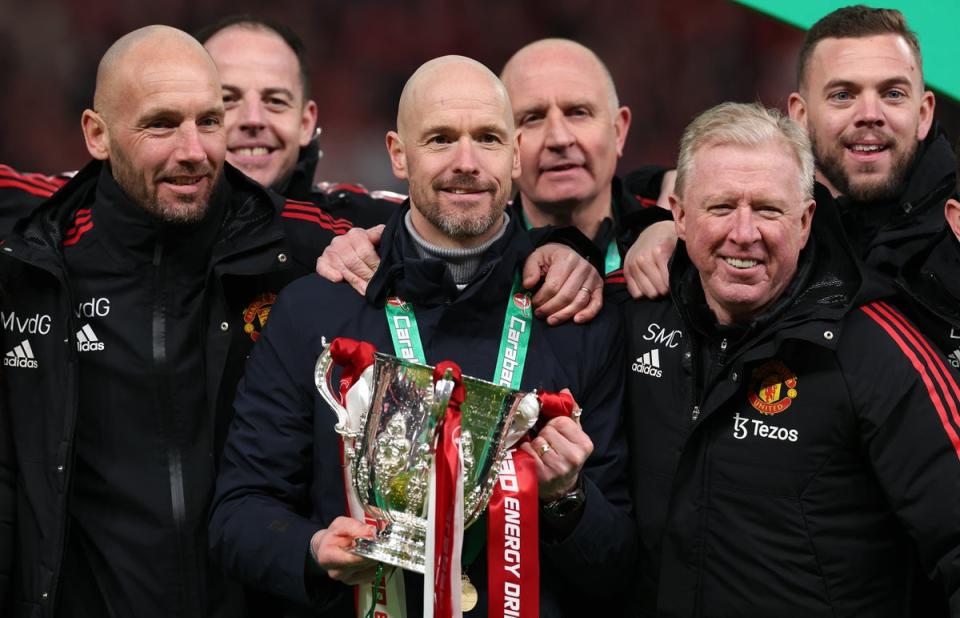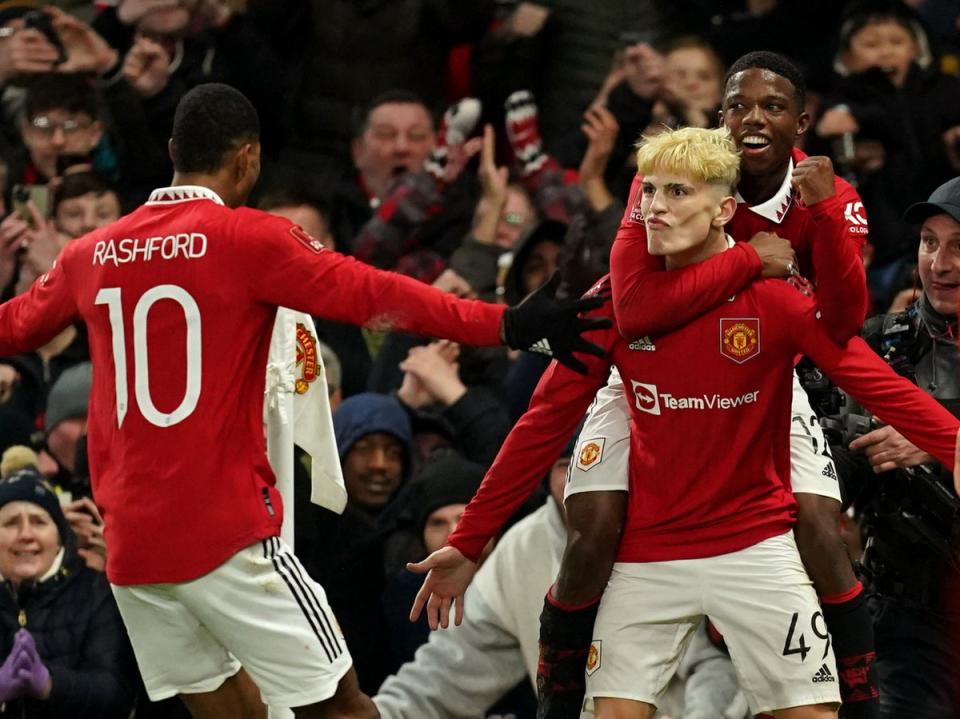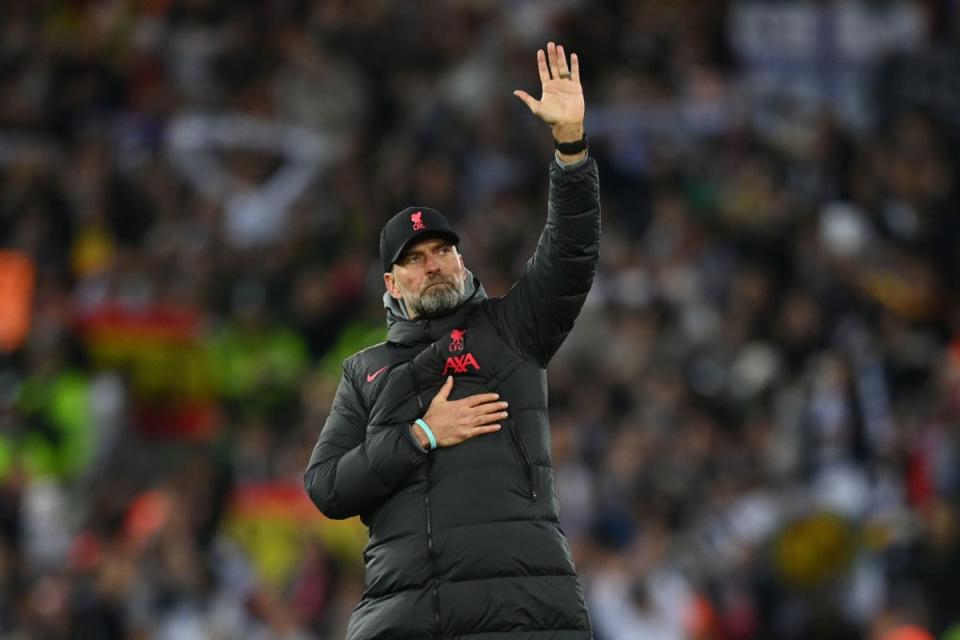Why the power in Liverpool and Manchester United’s rivalry is set for another shift
Within both Liverpool and Manchester United, they’ve already started to look to the summer as much as this weekend. United want a striker, Liverpool need much more, and may spend much more.
That is because of a huge change in fortunes within the Premier League’s greatest rivalry. While United have started to drastically outperform Liverpool on the pitch, the Anfield club have again recorded a higher revenue off it.
The two are of course far more interconnected than these sparse facts indicate, and the same can be said of two great clubs who will always operate in tandem - even if it’s a historical quirk that they have never been at peaks at the same time. In the last two months alone, it could have been a landmark moment for the English game were its two biggest clubs to be sold at the same time.
As it is, one has again influenced the other.
The difference in revenues comes on the back of a half-decade when Liverpool were possibly the most exciting team in football, while United endured one of the drabbest spells in their modern history. It was nevertheless the United’s long reputation as one of the biggest money-makers in the game that ensured Fenway Sports Group sought to sell at almost exactly the wrong time.
The Anfield hierarchy were not just facing into a market that was much more restricted than expected from the Chelsea sale, but were also up against perhaps the biggest brand in global sport. That’s all the worse for Liverpool given that it was their initial decision that first influenced the Glazers to put United up for sale. FSG have since taken their club off the market.
The Old Trafford hierarchy may yet follow suit, with other events at Anfield influencing decisions.
Since the Glazers have not yet received an acceptable offer for United, understood to be around £6bn, it is highly possible they decide to stay and bring the club into a third stage of this ownership.

That should put a new light on conspicuous comments made at the start of the second stage.
Back in December 2013, just a few months after Sir Alex Ferguson retired and David Gill departed, recently appointed executive vice-chairman Ed Woodward gave an interview to fanzine ‘United We Stand’.
“The reality is that you can’t always win,” the former banker argued. “Take Liverpool. They sell an incredible number of shirts and have the second biggest shirt deal in the Premier League. They have one of the biggest technical partner deals - and they haven’t won the league since 1990. And you can put the last bit underlined and in capitals.
“If we have a bad year we have the financial strength to change the team. We have so much deeper financial strength that instead of selling three players and buying three, we can do five.”
Woodward doubled down on this in even clearer terms during a quarterly conference call with shareholders in May 2018: “Playing performance doesn't really have a meaningful impact on what we can do on the commercial side of the business,” he said.
Both Liverpool and United have gone some way to disproving that, with results that you might say can be underlined and in capitals.
Liverpool’s title victory - as well as all of the sensational football around it - has seen them overtake United in a manner that would previously have been considered unimaginable. They have both proven that, as advanced as any financial plan for a club is, you can’t completely outrun the Florentino Perez “virtuous cycle”. Excitement on the pitch leads to economic success off it. Now, it is allowing the Glazers to envision a different future.
The split in the family over what comes next is well known, and Joel and Avram would prefer not to sell. This is a viewpoint that has only been given further consideration by United’s current form. It is a long time since the club has felt like this. It’s been a long time since they lifted a trophy.
Even more pointedly, and particularly in that signpost Europa League second leg against Barcelona, there was a real exilaration about how United played. Erik ten Hag’s football was reminiscent of Klopp’s Liverpool in its devastating directness.

This is why people in football are again talking about United as the future. If so, it could yet mean United enjoy a huge jump in revenue, despite a lot of talk about the club being “maxed out”. There is an awful lot of prize money and connected increases they are not yet availing of. Liverpool, after all, enjoyed an immense £261m in media revenue from their runs through so many cups last season. It creates buzz.
That’s not to say such buzz or increased revenues would make the Glazers’ issues go away.
One of the main reasons they put the club on the market is because they are at the point where investment is required - especially as regards the stadium. There would still be the debt. There are still the current global interest rates.
There is still a view that if Qatar really want to seize this rare opportunity for a prize institution like United, they will eventually pay what is required. There is also that lingering feeling from all involved parties that the Glazers were only ever testing the ground.
On that, there should be a lament that a fixture of such history - and one that could go someway to deciding the future - is being framed by issues far above the actual pitch. This is the world these clubs, and this league, have created. This is how they can field teams this exciting. This is how the Premier League attracts the best managers and consequently the most forward-thinking tactical ideas.
You can draw a direct line between United’s 1991 flotation on the stock market and this very discussion.
The tragic irony, of course, is that the grimness of these debates is - just like the clubs - directly connected to the beauty of the football produced.
United’s new pace is not just reminiscent of peak Liverpool, after all, but as if reflective of a new synthesis between Klopp’s aggression and the Dutch school that both Pep Guardiola and Ten Hag come from. This is what is so exhilarating, that we are seeing something different. It is also arguably the first time in well over a decade where a United team feels on an upward curve as Liverpool stagnate, or even go into the decline. An away win would even represent the first time the Manchester club do the double in this fixture since 2015-16.

It says much that, in beating Liverpool in his first ever game against them - that juncture 2-1 in August - Ten Hag actually matched the number of wins that both Jose Mourinho and Ole Gunnar Solskjaer had in the same fixture. The Norwegian’s sole victory didn’t even come in the Premier League but in the FA Cup in lockdown.
Much of that was of course about how good Liverpool were - but that’s also where the tone has shifted.
It all feeds into these plans for the summer. United are already like Liverpool between 2017 and 2019 in that Ten Hag has imposed a framework and you can see specific individual positions that need improving. Signings look obvious, just as was the case with Klopp for so long. It is why a forward - and especially a fast forward like Victor Osimhen - is a priority. Liverpool are meanwhile like United in much of the last decade in that they could do with a general overhaul. That clarity is no longer there.
Some of this, ironically, is down to the finances. As Liverpool have improved, their wage bill has drastically increased, leaving them with new problems. United were meanwhile aided by that history of money-making, as they were able to make signings that Klopp couldn’t.
It could all come full circle.
It’s why this weekend isn’t just about the game.

